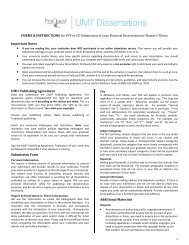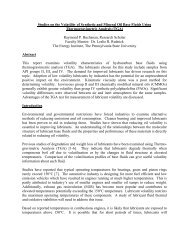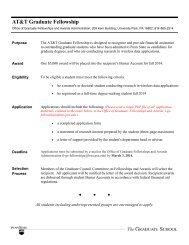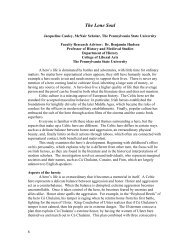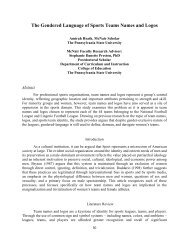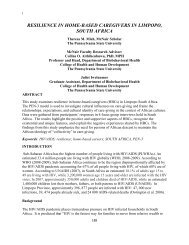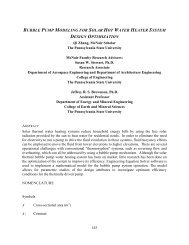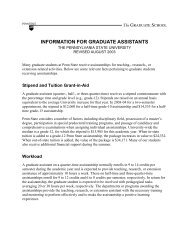1 GRADUATE COUNCIL MEETING 9 May 2012 102 Kern Graduate ...
1 GRADUATE COUNCIL MEETING 9 May 2012 102 Kern Graduate ...
1 GRADUATE COUNCIL MEETING 9 May 2012 102 Kern Graduate ...
Create successful ePaper yourself
Turn your PDF publications into a flip-book with our unique Google optimized e-Paper software.
E7<br />
• Bhushan M. Jayarao, (Budapest, Hungary), Professor Veterinary Science<br />
• Akhlesh Lakhtakia, Ph.D. (Utah), D.Sc. (BHU, Varanasi) Charles G. Binder<br />
Professor, Engineering Science, and Mechanics<br />
• Cedric Neumann, Ph.D. (University of Lausanne, Switzerland), Assistant Professor<br />
of Statistics, Forensic Science<br />
• Ralph R. Ristenbatt (John Jay College of Criminal Justice), Senior Research<br />
Assistant, Forensic Science<br />
• Reena Roy, Ph.D. (Nebraska) Associate Professor of Biochemistry and Molecular<br />
Biology, Forensic Science<br />
• Jenifer Ann Smith, Ph.D. (Ohio State), Professor of Practice, Forensic Science<br />
The Master of Professional Studies (MPS) in Forensic Science is an inter-college degree<br />
program housed in the Eberly College of Science and includes ties with Departments of<br />
Anthropology, Biochemistry and Molecular Biology, Chemistry, Entomology, and<br />
Sociology. The program is offered by Penn State graduate faculty members, with<br />
enrichment by mentors from the academic faculty, public crime laboratories, and<br />
private forensic laboratories. The curriculum is designed to provide students with<br />
innovative, hands-on, and multidisciplinary learning approaches to educate and train<br />
them in crime scene investigation, the science behind forensics, courtroom proceedings,<br />
and the ethical and social issues that they will be exposed to when they join the forensic<br />
community. In addition, the program will develop teamwork and communication skills,<br />
which will be important when working actual cases in a crime laboratory.<br />
Admission Requirements and the Application Process<br />
Applications will be considered in accordance with the requirements of the <strong>Graduate</strong> School<br />
as described in the GENERAL INFORMATION section of the <strong>Graduate</strong> Bulletin. The<br />
Master’s degree in Forensic Science is appropriate for students with a baccalaureate degree<br />
in the biological sciences, chemistry, or a related field of study. Applicants are required to<br />
have a minimum cumulative GPA of 3.00 (on a 4.00 scale) in their undergraduate degree.<br />
The GRE’s are required, with a score of 1100 (old system) or 306 (new system) to be<br />
competitive. In addition, each applicant is asked to provide a personal statement of<br />
interests and objectives , a statement of their definition of the word “ethics”, and two letters<br />
of reference. Letters of reference can be submitted by the student's undergraduate advisor,<br />
research advisor, and/or an instructor for an upper level course taken as part of their major.<br />
An applicant may be asked to go through an interview process conducted by members of the<br />
forensic science faculty. Admission to the program is based upon a thorough review of all<br />
applicant qualifications, and the best-qualified applicants will be accepted up to the number<br />
of spaces available for new students.<br />
Applicants are referred to the program web site for guidance on how to submit their<br />
applications, the deadline for submitting applications, and when decisions on acceptance<br />
into the program will be announced: www.forensics.psu.edu.<br />
Degree Requirements<br />
A minimum of 30 graduate credits is required for completion of the program, at least 18<br />
credits from courses at the 500 and 800-level. Students are required to take 16 credits from



